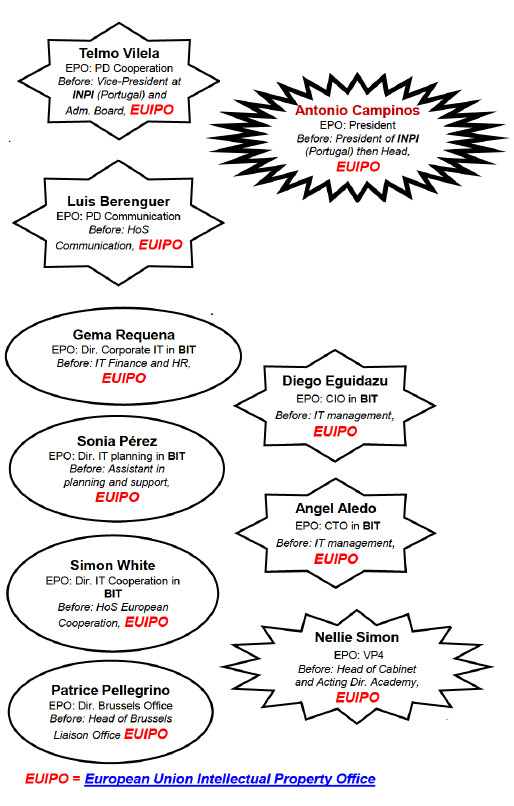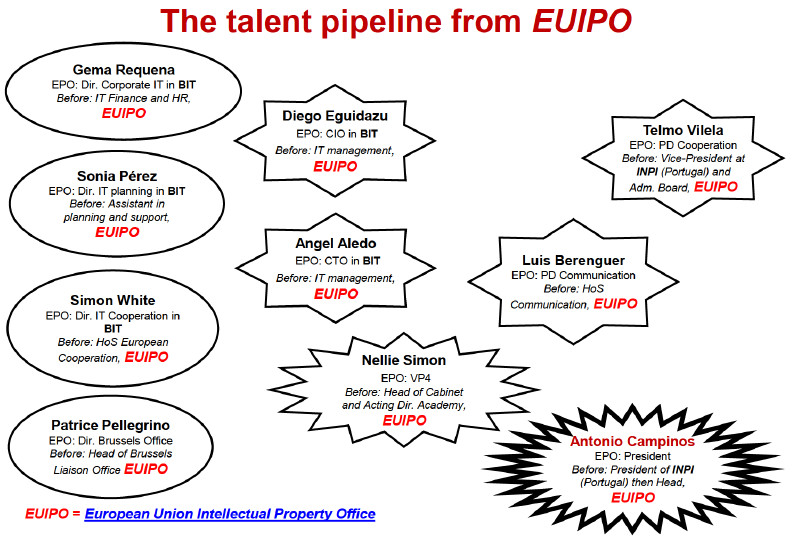


THE EPO's Central Staff Committee is seeing all the same crimes and abuses of Benoît Battistelli mirrored by the regime of António Campinos. Just like Battistelli brought in ('imported') lots of former colleagues from INPI, Campinos brings his colleagues from EUIPO and the list of these colleagues is getting too long to keep abreast of. What is this, Mafia Family? Even Donald Trump didn't appoint that many personal confidants in spite of no/lacking qualifications.
"Notice how much of the Office is being outsourced to an American mass surveillance company (Microsoft), best known for crimes including bribery (notorious examples in Munich).""With the COVID-19 crisis," the Central Staff Committee wrote 7 months ago, "Mr Campinos pushed a number of decisions that surprised staff and that many of us do not understand. In an open letter to Mr Campinos, the Central Staff Committee (CSC) questions: the mandatory registration of teleworking in MyFIPS, the obligation to provide the Office with private mobile phone numbers in the context of using MIR3 for emergency messaging, the use of iLearn on LinkedIn and the paperless dossier treatment. To this effect, the CSC has also addressed the new Data Protection Officer (DPO) freshly arrived through the talent pipeline from the EUIPO in Alicante."
Notice how much of the Office is being outsourced to an American mass surveillance company (Microsoft), best known for crimes including bribery (notorious examples in Munich). Nothing has changed since the 1990s, but the EPO acts like a business partner of those thugs; we suppose criminals attract other criminals.
What's referred to as "talent pipeline from the EUIPO in Alicante" is Ms Mariya Koleva. Here's the full letter.
Reference: sc20066cl-0.3.1/5.3 Date: 16.04.2020
European Patent Office | 80298 MUNICH | GERMANY
Mr António Campinos President of the EPO
ISAR - R.1081
Changes may be necessary, but there’s a proper way for doing it
Dear Mr President,
We would like to follow up some points raised under any other business during last week’s virtual GCC-meeting.
COVID-19 brought with it a need to act, which the Office duly did. We are experiencing changes that we would not have thought possible. Some of the decisions you took surprised staff and many of us do not understand why they were taken.
We briefly touched the wavetops during the GCC-meeting.
Registration of teleworking in MyFIPS
With your instruction, given in the absence of any consultation, you compel staff to register teleworking in MyFIPS and to provide full contact details including their private mobile phone number.
As already argued in the GCC, managers know from where their staff is working and how they can be contacted, so there is no need for registering teleworking in the system. Staff working from home logs into VPN as teleworking and Security knows from the use of the badges who is in the building. But you did not limit yourself to that. You also requested the distinction between teleworking and mandatory teleworking. The sense of that distinction and the use of any data gathered with such registration does not reveal itself to staff. In brief, there is a lot of explaining, convincing and formal consulting to be done.
Providing private mobile phone numbers in the context of using MIR3 for emergency messaging
Since the GCC meeting it transpired that apparently no corners are being cut on data protection and data storage issues and that the Office’s checks reliably kick in. We also understand better why the Office wants such an emergency messaging system, but compelling staff to give a private mobile phone number is a bridge too far. In the recent past there has been too much abuse of staff’s trust, so a certain reticence in providing private numbers is to be understood. From what we have gleaned since the GCC-meeting, the arguments for providing that private phone number appear to be convincing. Here, too, transparency and involvement would get most of staff to volunteer their number. It cannot be anything but voluntary, based on an informed decision, if trust isn’t going to be eroded any further. Case law in Germany has confirmed the voluntary nature of divulging private phone numbers to the employer.
iLearn on LinkedIn (not mentioned during the GCC-meeting)
The recent initiative of launching e-learning opportunities on LinkedIn appears to provide full EPO user data to LinkedIn and colleagues who registered are confronted with LinkedIn services they do not appreciate, such as networking suggestions. We see a need for consultation on data protection issues here. As it stands, if asked by a staff member, we at present would not be able to recommend registering for this new opportunity.
Paperless dossier treatment – Signing out production
Here, too, as pointed out, we have data protection concerns regarding the access to production data of a directorate to staff other than directors.
The way forward
Consultation is overdue, which may imply GCC consultation or, in some cases, transparent information from the Office’s experts to the Staff Committee experts. In view of the recent appointment of Ms Koleva as DPO a good start could be for her to meet a CSC-delegation to get to know each other and to address the data protection aspects of the above issues in preparation of further consultation. We have separately addressed Ms Koleva to that end.
We look forward to your positive response to our request.
Yours sincerely,
Joachim Michels
Chairman of the Central Staff Committee cc.: Ms Mariya Koleva; Data Protection Office